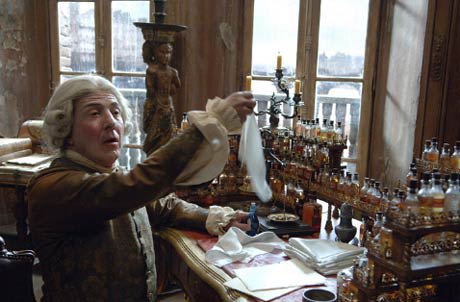In adapting Perfume, based on the best-selling 80s novel by Patrick Suskind, director Tom Tykwer (Run Lola Run) successfully overcomes the first major hurdle: somehow making a movie about the worlds greatest nose come to life through visual and sonic cues. The story of Jean-Baptiste Grenouille (Ben Whishaw), born in an 18th century French slum, is the story of his olfactory gifts - he can dissect any and all smells in the world, uses them as his guide and eventually his gift when he apprentices under perfumer Giuseppe Baldini (a bewigged and heavily made up Dustin Hoffman). As a perfumer, Grenouille learns the trade of capturing scents (typically flowers and spices) then turns it into an obsession as he attempts to encapsulate the scent of innocent beauty in the form of beautiful young virgins, whom he murders. Its in the second major hurdle - humanising and understanding Grenouilles motives - that Perfume is less successful. Grenouille is haunted by the fact that he himself bears no personal scent, no signature smell that distinguishes him from every other living thing; in the novel, this makes him a devil spawn outcast but in the form of Ben Whishaw, the films Grenouille is charming (albeit creepy), not a flee-from-the-possessed horror. When Grenouille becomes obsessed with creating the ultimate perfume (from the accumulated essence of his victims), he does so in order to be loved and accepted as hes never been before; in the film, this scent psychopath merely comes across as a unique sociopath but little more. That leaves Perfume: The Story of a Murderer as little more than a killer story, lacking in the ultimate sympathy for its pathetic protagonist. Without this insight, Perfume is simply a good period piece drama that doesnt delve any deeper into understanding the place of scent in human culture, nor its role in love, lust or religious ecstasy. A perfunctory "making of featurette goes no deeper.
(DreamWorks)Perfume: The Story of a Murderer
Tom Tykwer

BY James KeastPublished Jul 19, 2007